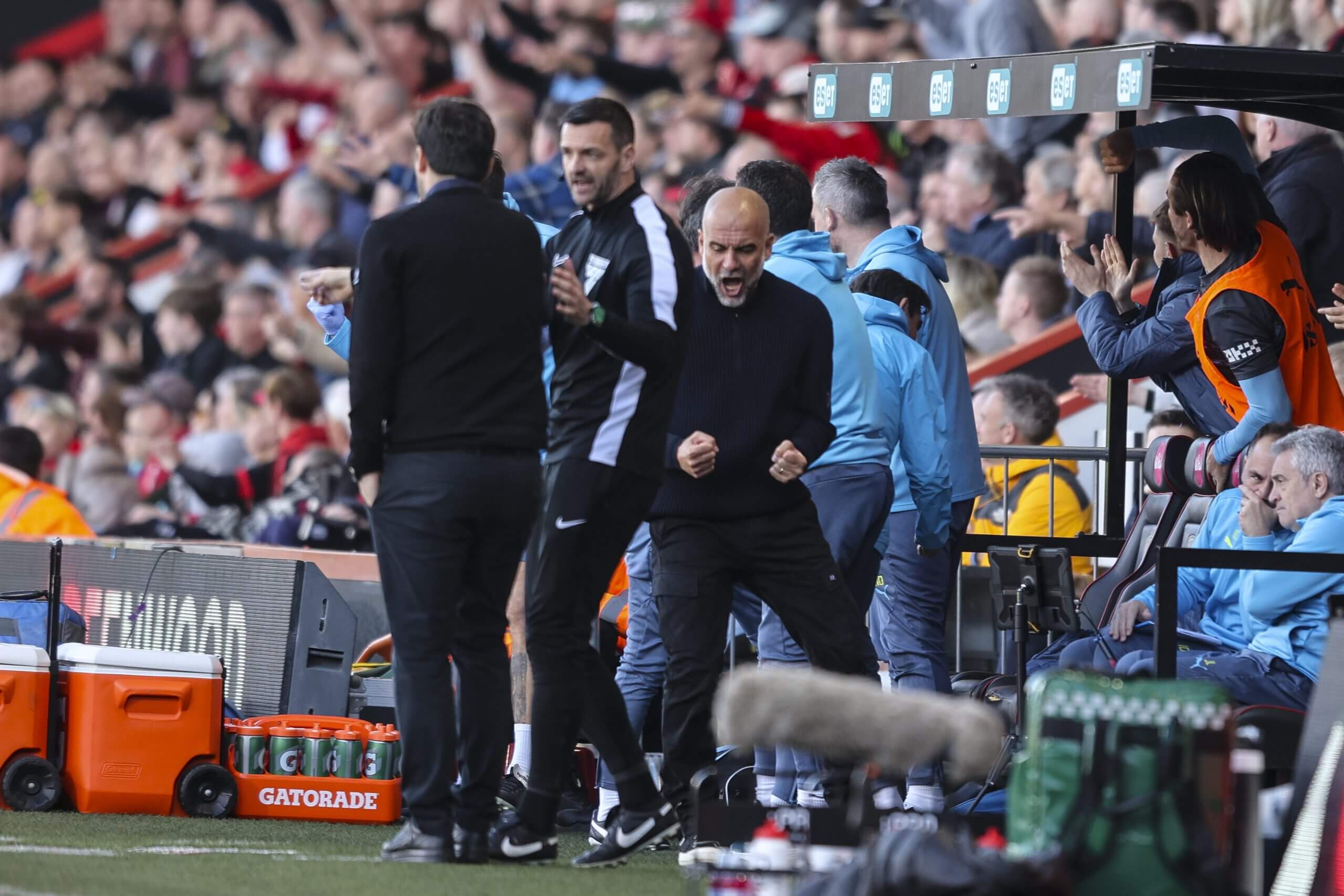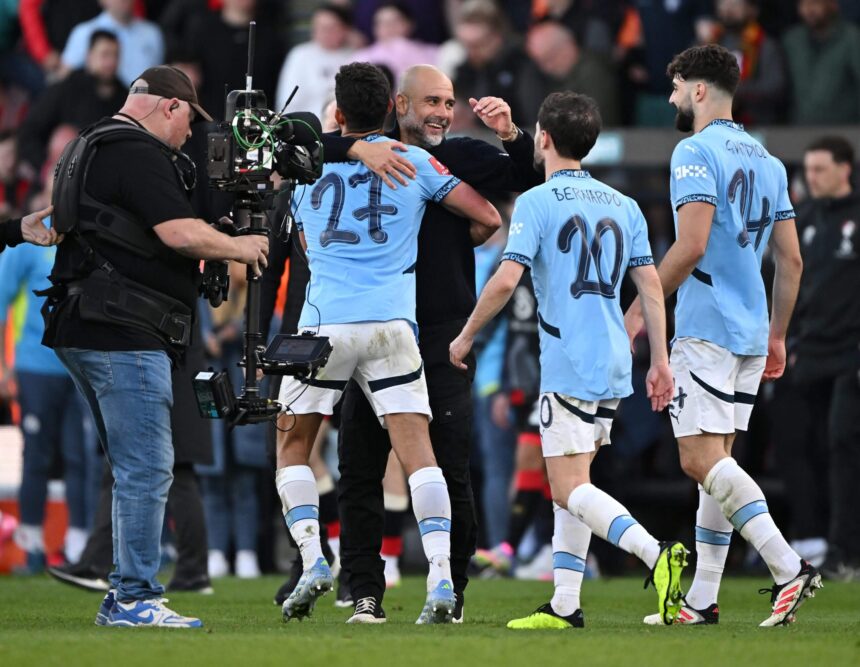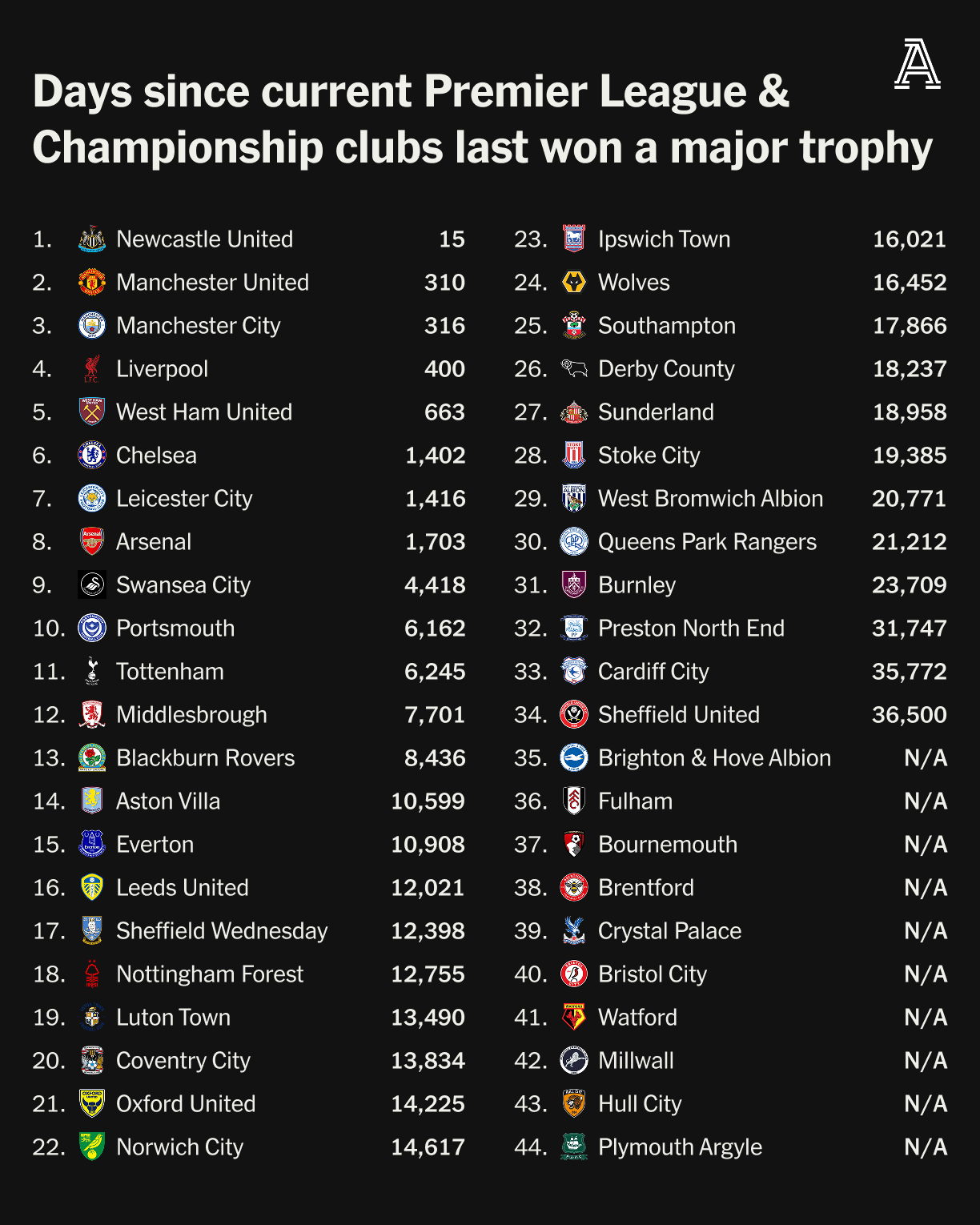Sorry for the inconvenience, but Manchester City have made the FA Cup semi-finals again.
FA Cup lore has become so much about underdog stories and giant-killings that the bigger teams are almost treated as an afterthought: just ask Aston Villa, who were the sideshow to Preston North End’s attempts to win the trophy for the first time since 1938.
Advertisement
Unfortunately for the nation, Villa made light work of a 3-0 victory. But if Unai Emery’s side — the kind of likeable, inoffensive team that many neutrals will be rooting for against Paris Saint-Germain in the Champions League — can get that kind of treatment, then what chance have all-conquering, oft-hated City got?
Pep Guardiola picked up on the vibe before kick-off when he was asked on television about the special occasion as Bournemouth attempted to reach their first FA Cup semi-final.
“You’re right,” he said. “And we’ve never been in an FA Cup semi-final seven times in a row either.”
They have now, to the annoyance of many who were not just rooting for the underdog at the Vitality Stadium, but also dreaming of a showdown of four teams who would desperately love to win the FA Cup this season.
Because, of course, the sentiment goes that City winning the FA Cup could not possibly mean anything to them.
Guardiola celebrates after his side’s 2-1 win at Bournemouth (Mike Hewitt/Getty Images)
With the semi-final draw conducted seemingly on the hoof before kick-off in Bournemouth — Joe Hart produced a velvet bag from somewhere and the BBC pundits at Deepdale decided the Wembley line-up in about a minute — attentions were already turning to a sun-drenched weekend of proper teams trying to win a proper trophy.
Villa versus Crystal Palace, Nottingham Forest versus Bournemouth or Manchester City (but hopefully Bournemouth).
Of course, there would be a certain romance in those matches had Bournemouth gone through. It would have been four teams fighting it out to win a major trophy either for the first time ever or in generations (Villa were the most recent, lifting the League Cup 29 years ago).
Those sides will have seen the joy of the Newcastle fans and players when they won the Carabao Cup a fortnight ago, and celebrated it in the city over the weekend, and thought, ‘Why not us?’
Clearly, nobody can deny that winning the FA Cup would mean an incredible amount to Palace, Villa and Forest. Their players instantly becoming legends. They would almost certainly have a parade like Newcastle did. Would City parade through the streets with the FA Cup, given all they have won, on the back of this otherwise bleak season?
Advertisement
Maybe they would, you know, such is Guardiola’s determination to celebrate their achievements. Last season, he had hoped for a bus parade the very night of their Premier League title victory in case they did not beat Manchester United in the FA Cup final the week after, taking the shine off things. In the event, they waited until after the final, lost, and partied anyway.
But that is beside the point. We know why City are not held in the same regard as the other semi-finalists, far beyond the British love of an underdog.
The football world spent the international break waiting for a verdict on the 115/129/130 charges against them, stirring up all the sentiment that brings with it. Any team that wins everything becomes hated, that is how things work here, and City are certainly no different — but on this FA Cup weekend of support for the little guy, it really is highlighted how much they are the antithesis of what us rough-and-tumble Brits want to see from the cups.
“It’s an incredible achievement because it’s every year, every year, every year — you know how difficult is League One, the Championship? You can drop, you can lose, but it never happened,” Guardiola said afterwards.
This season, they went to Leyton Orient of the third tier and went behind, stoking hopes of an upset, but wrestled control of the second half and won 2-1. They went behind to Plymouth Argyle of the Championship at home, but won 3-1. In this run of seven consecutive semi-finals, they have been to Bristol City, Peterborough United, Swindon Town, Cheltenham Town, Sheffield Wednesday and Newport County. No drama.
The last time they suffered an upset was at Wigan Athletic seven years ago.

Guardiola shows what victory means to Manchester City (Robin Jones – AFC Bournemouth/AFC Bournemouth via Getty Images)
All of this brings us to what this actually means to City. To their fans, of course it would mean a lot. This is a fanbase that used to be held up as the paragons of dedication in the days when United won every season and City were bouncing around the divisions, but now — a byproduct of becoming hated by winning — they are regarded as glory hunters.
Advertisement
Without lapsing into cliche, many of them would have been around for the defeat at York City in 1998, widely recognised as the lowest point in the club’s history. Will winning the FA Cup for the third time in the last six years mean that much?
Maybe not as much as it would to the Villa, Palace or Forest fans, many of whom would be celebrating something for the first time in their lives — their equivalent of City’s win against Stoke City in the 2011 final — but do not get caught up in underdog hyperbole. It means something.
Not that it compares to the droughts of the other teams, but if City do win the FA Cup this season, it will only be their fourth since the 1960s. It was not that long ago that they lost the final against Wigan, one of the biggest ‘cupsets’ of all. Last year’s defeat by United will still sting, too.
Yes, they have won a lot, but they have not won this trophy quite as often as one might assume. If there comes a point when a club and its fanbase lose their gusto for winning, it has not happened to City fans yet.
Or to Guardiola. Some have suggested that he was close to deciding not to extend his contract back at the start of the season, to finally call it quits this summer, but their struggles led him to renew his deal. He gave an interview around the time of his new contract where he essentially described being addicted to the job — it is not good for him, but he cannot stop.
During his post-match press conference, he teased that — one day, when he writes his memoirs — he will give his thoughts on why City dropped so far so quickly this season. Maybe the fire has gone out, it is hard to tell among so many injuries and, as Guardiola suggests, a thousand other things.
He did say that he was the first to blame, though. At another point, he suggested they were in this position because they performed meekly in too many matches, like they did against Bournemouth in November, and not enough like they did on Sunday — when they fought and battled.
Advertisement
Those qualities brought them to all the other semi-finals, and it has now brought them to another. The nation might not be toasting their latest victory but look on the bright side: had City gone out this weekend, there would have been no underdogs left to get behind.
(Top photo: Charlotte Wilson/Offside/Offside via Getty Images)







